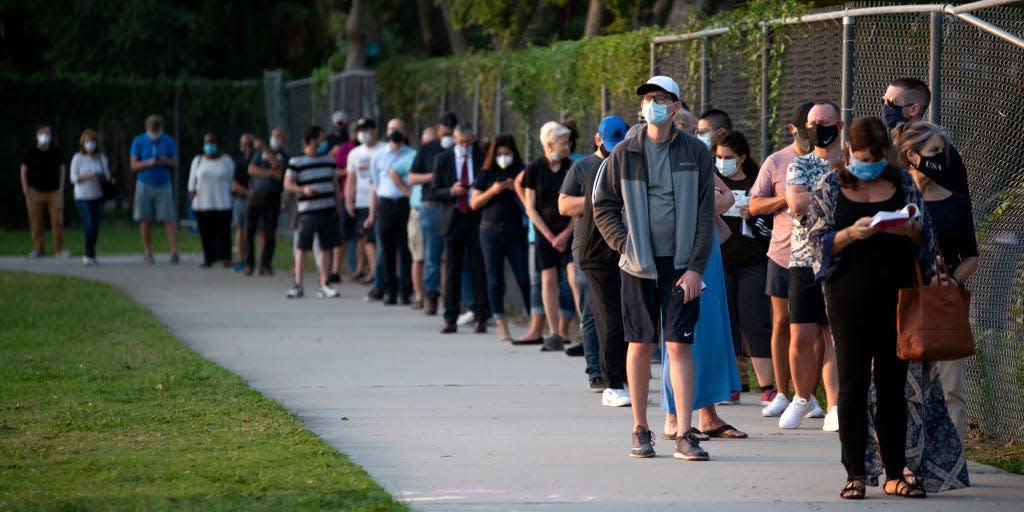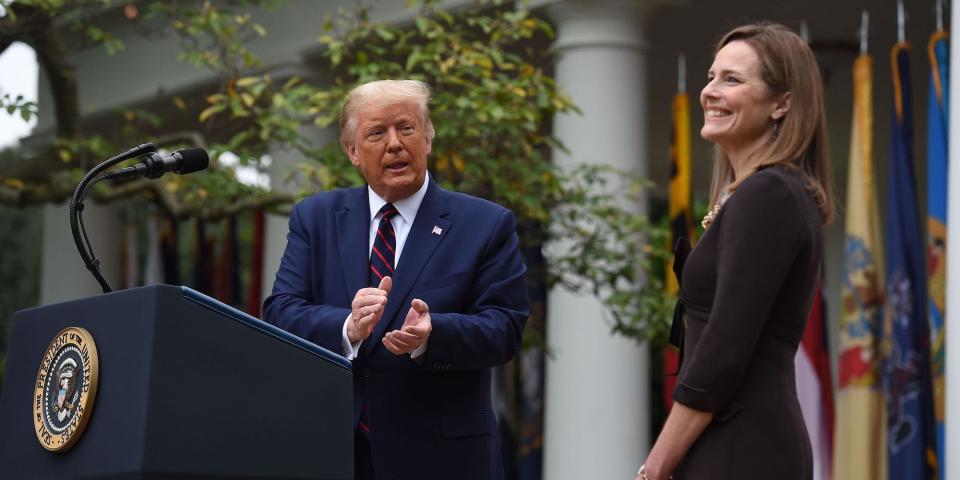Democrats say they fear election-week chaos, including vote-counting delays and violence in the streets

Democratic operatives are concerned about several nightmare scenarios during election week.
Among the issues Democrats fear are long lines at polling places, delayed vote counts, legal fights, and the president's efforts to undermine the legitimacy of the election.
Business Insider talked to half a dozen Democratic strategists and pollsters about their fears for election week.
Joe Biden, the Democratic presidential nominee, is leading President Donald Trump in both national and state polls and is favored to take the White House.
While Democratic operatives are optimistic about Biden's chances, they're also sounding the alarm about a host of election-week issues such as long lines at polling places, delayed vote counts, legal fights, and the president's efforts to undermine the legitimacy of the election.
Challenges at the polls and delayed results
Democratic activists and voting-rights advocates have condemned hours-long lines to vote, technical issues at polling places, and partisan pranks during early voting. They fear that these obstacles will continue through Election Day and suppress votes in key states.
Basil Smikle, a Democratic political consultant and former executive director of the New York State Democratic Party, said that while the massive early-voting turnout was good news for Biden, the big numbers might not be enough to overcome systematic issues with voting.
"There's a tremendous amount of enthusiasm and intensity in this race — if it's not pro-Biden then it's anti-Trump — and it suggests that the Democratic messaging around making a plan to vote and voting early has gotten through," Smikle said. "But it also suggests that there are substantial problems with our election infrastructure and there are significant concerns about the potential for those votes to not be counted because of suppression and intimidation."
With the historic surge in mail-in ballots, several battleground states expect that it will take days after Election Day to finish counting votes.
Just eight states have said they expect to have 98% of their ballots counted by noon next Wednesday, The New York Times reported this week. More than 20 states will continue to count ballots as they arrive after Election Day, so long as they were postmarked by Tuesday, November 3. US Postal Service delays could further complicate this counting process. The number of provisional ballots, which often take longer to verify and count, is also expected to rise.
Election officials in Pennsylvania and Michigan — both key battleground states — have said they expect to report their vote counts up to three days after Election Day. In Pennsylvania, election officials are permitted to begin counting mail-in ballots only once the polls have closed, and in Michigan, officials can begin verifying mail-in ballots only on the day before Election Day. Officials in Georgia, another key swing state with two Senate seats on the ballot, have also said it's likely to take a few days to tabulate all votes.
Charlotte Swasey, the vice president of data and polling at the left-leaning group Data for Progress, said she was concerned that delayed ballot counting would cause confusion and allow misinformation to spread next week.
"I don't think anyone is braced for how long this is going to take," Swasey told Business Insider. "I'm just concerned that we're going to have this extended period of time where people are just exhausted and looking for certainty that isn't going to be there."
Because of the sky-high number of mail-in ballots this year, experts have predicted that a handful of states will experience a so-called red mirage, in which a state sees in-person GOP votes misleadingly indicate it's leaning toward Trump but later experience a "blue shift" as disproportionately Democratic absentee ballots are counted.
This phenomenon may be particularly apparent in battleground Midwestern states like Michigan and Wisconsin, which are expected to count their substantial mail-in ballots later. Meanwhile, Florida, Arizona, and North Carolina may experience blue mirages.
Trump has called to cut off ballot-counting at midnight on Election Day, which would violate many states' election laws and might help him in states with a red mirage.
Ian Russell, a former deputy executive director of the Democratic Congressional Campaign Committee, argued that Trump's underdog status would make it awkward for him to fight against vote counting.
"If you go in as the underdog, you say, 'We've got to count every vote, and we're going to be making sure every vote that was cast is counted fairly, and we're going to keep our options open,'" he told Business Insider.

Legal battles
Activists on both sides of the aisle filed hundreds of lawsuits challenging states' pandemic-related voting regulations in the months leading up to the election. Republicans have largely attempted to make it more difficult to vote, while Democrats have pushed to loosen restrictions on voting.
Biden's campaign has drafted hundreds of lawyers, including top former Obama administration officials, to wage several fights related to ballot casting and vote counting.
Rep. Elissa Slotkin, a freshman Democrat from a purple Michigan district, recently told Politico she thought the GOP would focus its legal efforts on challenging outcomes in individual counties in Michigan, Florida, and Pennsylvania.
"Legitimate or illegitimate, I think one of the president's strategies is going to be to protest the results in certain key counties in certain key states," she said.
Democrats are desperate to keep election-related lawsuits out of the Supreme Court, which now has a conservative majority following Justice Amy Coney Barrett's confirmation this week.
The high court has already hinted that it would defer to Republican state officials and legislatures in determining how to run their elections, including when they decide to limit vote counting and throw out ballots. This week, it sided with Republicans in Wisconsin by overturning a federal court ruling allowing election officials to count mail-in ballots that were postmarked by Election Day for up to six days after November 3.
"Everybody's goal is to keep this damn thing away from the Supreme Court so that there's no reason for them to intervene," Russell said.
A solid Biden victory would likely discourage the court from intervening and ruling in Trump's favor — a move that could undermine its legitimacy.
A refusal to concede?
The president has for months claimed he can't legitimately lose the election and has refused to commit to a peaceful transfer of power. He's claimed that this year's election will be "the most corrupt election in the history of our country" and that mail-in voting will be "a fraud like you've never seen."
"The only way we're going to lose this election is if the election is rigged," Trump said in August.
Trump's allies have boosted those claims. Donald Trump Jr., the president's eldest son and top campaign surrogate, has accused Democrats of planning to "add millions of fraudulent ballots that can cancel your vote and overturn the election."
Democrats are raising alarms about how Trump might attempt to cling on to power or undermine the election outcome and the transition process if he loses.
"Trump has shown a willingness to weaponize the federal government for his political purposes in a way never before seen," Jesse Ferguson, a Democratic strategist who served as a spokesman for Hillary Clinton's 2016 campaign, told Business Insider. "What worries me in a week is, if he loses, it will ignite a revenge from him on the American people."
While the president's attacks on the integrity of the election are relatively predictable, it's less clear how Republican leaders will handle election night and the following days.
Russell argued that all eyes would be on GOP leaders in the House and Senate and whether they'd back up Trump's voter-fraud claims and push for the Supreme Court to take up any election disputes.
"The question really becomes … what does Mitch McConnell, what does Kevin McCarthy, what does the remaining Republican leadership do?" Russell said. "Do they really want to, first of all, cast doubts on the legitimacy of their own reelections? And do they want to go down with a ship that's already struck the iceberg and is flooding?"
How state-level Republicans respond will also be crucial.
Ed Sarpolus, a Michigan-based Democratic pollster and consultant, said he feared that Republicans would effectively suppress Black and Brown voters in Michigan with restrictions on mail-in voting, a ban on third parties transporting voters to the polls, and insufficient voting machines on election day.
"The bottom line is if Trump takes more interest in Michigan again, that increases the chances that there will be more threats and attempts to suppress the vote," he told Business Insider. "The question is what do his lieutenants do in Michigan?"

Potential chaos in the streets
Far-right provocateurs have fearmongered about violence breaking out between Trump and Biden supporters after Election Day. Roger Stone, a former Trump advisor whose prison sentence the president controversially commuted earlier this year, said Trump should impose martial law and imprison his political opponents if he loses the election.
Trump has said he would eagerly "put down" any left-wing protests after the election. And Trump Jr. has starred in Trump campaign ads calling on "able-bodied" supporters to "enlist" in an "army for Trump's election security operation" to prevent fraud on Election Day.
On Wednesday, the leader of the prominent right-wing militant group Oath Keepers told the conspiracy theorist Alex Jones that he and fellow militants planned to "protect" Trump voters at polling places across the country on Election Day. The group's leader, Stewart Rhodes, said that there might be a civil war between the right and the left after the election and that his members were prepared to kill "radical left" "street soldiers."
Christine Pelosi, a Democratic strategist and daughter of House Speaker Nancy Pelosi, said that violence over the election results would be the "worst-case scenario" next week.
"We can't afford to be drawn into the kinds of street demonstrations that Trump would like to see in order to justify some sort of martial-law idea," Pelosi said. "The worst-case scenario isn't that the voters make their choice and we lose — that would be terrible, but that's on us. The worst-case scenario is if we get goaded into some sort of national unrest."
Pelosi said Democrats needed to avoid "getting drawn into the histrionics" and "cynicism" and stay focused on protecting the voting process.
She argued that the "only antidote to all of my fears" is massive voter turnout.
Read the original article on Business Insider

